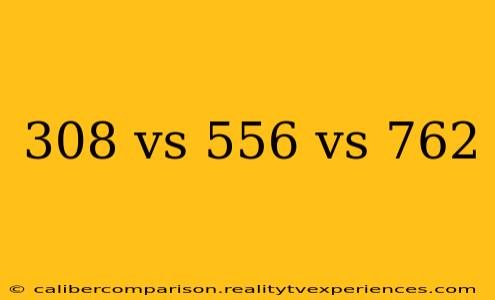Choosing the right caliber for your rifle is a crucial decision, impacting everything from accuracy and range to recoil and ammunition cost. This in-depth comparison of .308 Winchester (7.62x51mm NATO), 5.56x45mm NATO (.223 Remington), and 7.62x39mm will help you understand the strengths and weaknesses of each, enabling you to make an informed choice.
Caliber Overview: Key Differences at a Glance
Before diving into the specifics, here's a quick summary table highlighting the major differences between the three calibers:
| Feature | .308 Winchester (7.62x51mm NATO) | 5.56x45mm NATO (.223 Remington) | 7.62x39mm |
|---|---|---|---|
| Caliber | 7.62x51mm | 5.56x45mm | 7.62x39mm |
| Bullet Diameter | 7.62mm (0.308 inches) | 5.56mm (0.223 inches) | 7.62mm (0.308 inches) |
| Cartridge Length | Longer | Shorter | Shorter |
| Range | Longer | Shorter | Moderate |
| Energy | Higher | Lower | Moderate |
| Recoil | Higher | Lower | Moderate |
| Cost | Moderate to High | Moderate | Moderate to Low |
| Availability | Widely Available | Extremely Widely Available | Widely Available |
.308 Winchester (7.62x51mm NATO): The Powerful Workhorse
The .308 Winchester, also known as the 7.62x51mm NATO, is a battle-proven cartridge renowned for its power and accuracy. Its larger bullet diameter and heavier grain weights deliver substantial stopping power and impressive range.
Advantages of .308 Winchester:
- High Power and Energy: Provides significant stopping power, making it effective for hunting larger game and long-range target shooting.
- Extended Range: Its trajectory allows for accurate shots at significantly greater distances compared to 5.56x45mm.
- Penetration: Superior penetration capabilities, making it suitable for situations requiring more penetration through barriers.
Disadvantages of .308 Winchester:
- Higher Recoil: The substantial power results in noticeable recoil, which can be tiring for extended shooting sessions.
- Cost: Ammunition tends to be more expensive than 5.56x45mm or 7.62x39mm.
- Weight: The heavier cartridge contributes to increased rifle weight.
5.56x45mm NATO (.223 Remington): The Versatile Lightweight
The 5.56x45mm NATO, often referred to as .223 Remington (with slight differences in specifications), is a widely used cartridge known for its versatility and relatively low recoil. It's a popular choice for both military and civilian applications.
Advantages of 5.56x45mm NATO:
- Low Recoil: Makes it easier to handle and control, especially for beginners or extended shooting sessions.
- Lightweight: Contributes to a lighter overall rifle weight, enhancing maneuverability.
- High Rate of Fire: Allows for rapid follow-up shots.
- Affordable Ammunition: Generally less expensive than .308 Winchester.
Disadvantages of 5.56x45mm NATO:
- Lower Energy and Range: Compared to .308 Winchester, it has less stopping power and a shorter effective range.
- Limited Penetration: Penetration through barriers is significantly less than .308 Winchester.
7.62x39mm: The Affordable and Reliable Intermediate Cartridge
The 7.62x39mm is a commonly used intermediate cartridge, often found in AK-pattern rifles. It strikes a balance between power and recoil, offering a cost-effective option for various applications.
Advantages of 7.62x39mm:
- Moderate Power and Range: Provides a good balance between power and recoil, suitable for hunting medium-sized game and target shooting at moderate distances.
- Affordable Ammunition: Generally less expensive than .308 Winchester.
- Wide Availability: Readily available in many regions.
Disadvantages of 7.62x39mm:
- Moderate Recoil: While less than .308 Winchester, it has more recoil than 5.56x45mm.
- Trajectory: Its trajectory is less predictable at longer ranges compared to .308 Winchester.
- Penetration: Penetration capabilities are moderate, not as high as .308 Winchester.
Conclusion: Choosing the Right Caliber
The best caliber for you depends entirely on your intended use. Consider these factors:
- Intended Use: Hunting, target shooting, self-defense, or competition?
- Range: How far do you need to shoot accurately?
- Power: What level of stopping power is necessary?
- Recoil Tolerance: How much recoil are you comfortable with?
- Budget: What's your ammunition budget?
By carefully weighing these considerations, you can choose the caliber that best meets your needs and preferences. Remember, the best caliber is the one you are most comfortable and proficient with.

